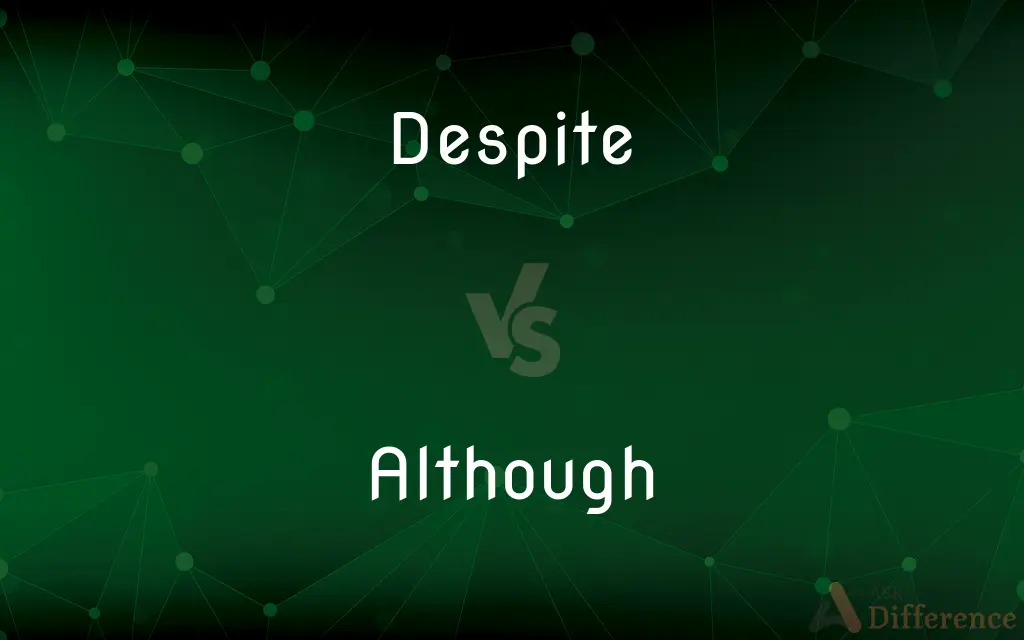Despite vs. Although — What's the Difference?
By Fiza Rafique & Maham Liaqat — Updated on March 30, 2024
Despite is used to introduce a fact that is in sharp contrast with another, without implying causation, whereas although introduces a subordinate clause, suggesting a contrast that is more directly connected to the main clause.

Difference Between Despite and Although
Table of Contents
ADVERTISEMENT
Key Differences
Despite is a preposition that introduces a noun, noun phrase, or gerund to indicate something that happens or is true even though there is a potential hindrance or contrast. It sets up a scenario where two elements are in opposition, but one does not directly affect the outcome of the other. For example, despite the rain, the event was well-attended. On the other hand, although is a conjunction that connects two clauses, where the clause introduced by "although" provides a contradiction or concession to the main clause. This creates a more integrated contrast, as in, although it rained, the event was well-attended.
Despite does not require a subject and verb in the contrasting element it introduces, making it more succinct in some instances. It can be particularly effective in sentences where brevity is desired or where the focus is on the contrast itself rather than the causal relationship. Whereas, although inherently ties two clauses together, requiring a subject and a verb in each clause, which can provide a more detailed and nuanced understanding of the relationship between the contrasting elements.
Despite is often used in contexts where the emphasis is on the resilience or persistence of the main action or situation despite obstacles or contrasts. It highlights the strength or surprise of the main clause prevailing. Conversely, although invites the reader to consider the contrast as an integral part of understanding the full context of the situation, often leading to a deeper reflection on the connection between the two elements.
The choice between despite and although can subtly change the emphasis of a sentence. Using despite might suggest a stronger sense of overcoming the contrast, while although might suggest a more contemplative acknowledgment of the contrast as a significant factor in the situation. Both, however, serve to illustrate the complexity of circumstances by acknowledging the presence of contrasting factors.
Both terms are used to introduce contrasts, despite often precedes phrases or gerunds, making it slightly more versatile in sentence structures that do not require full clauses. This can be particularly useful in more formal or written English where economy of language is valued. On the other hand, although, by connecting full clauses, often facilitates a more conversational tone, allowing for a more detailed exploration of the contrasting elements.
ADVERTISEMENT
Comparison Chart
Part of Speech
Preposition
Conjunction
Function
Introduces a noun, noun phrase, or gerund indicating opposition.
Connects two clauses, indicating a contrast.
Requirement
Does not require a subject and verb in the contrasting statement.
Requires a subject and verb in both clauses.
Emphasis
Highlights resilience or surprise by focusing on the outcome.
Invites contemplative reflection on the contrast.
Example
Despite the rain, the event was well-attended.
Although it rained, the event was well-attended.
Formality
Often used in more formal or written English.
Flexible, but can facilitate a conversational tone.
Compare with Definitions
Despite
Without being affected by; in spite of.
Despite the severe weather, the game continued.
Although
Introduces a clause that contrasts with the main clause to provide a nuanced view.
Although it's expensive, it's worth the investment.
Despite
Used to highlight a contrast without implying causation.
Despite the criticism, her book became a bestseller.
Although
Used to introduce a statement that makes the main statement seem surprising or unlikely.
Although tired, she completed the marathon.
Despite
Shows an unexpected outcome given the circumstances.
Despite his lack of experience, he excelled in his role.
Although
Connects ideas that might appear contradictory to draw a deeper insight.
Although he's usually quiet, he's a great public speaker.
Despite
Indicates that something happened or is true even if there were potential obstacles.
She achieved her goals despite the limitations.
Although
Indicates a concession or contrasting condition in a situation.
Although the job is challenging, it's very rewarding.
Despite
Refers to ignoring or overlooking conditions.
He remained cheerful despite the difficulties.
Although
Suggests a balance or consideration of two opposing facts or ideas.
Although we disagree, I respect your opinion.
Despite
Without being affected by; in spite of
He remains a great leader despite age and infirmity
Although
In spite of the fact that; even though
Although the sun was shining it wasn't that warm
Although small, the room has a spacious feel
Despite
Contemptuous treatment or behaviour; outrage
The despite done by him to the holy relics
Although
Regardless of the fact that; even though
Although the room is big, it won't hold all that furniture.
Despite
Contempt; disdain
The theatre only earns my despite
Although
But; however
He says he has a dog, although I've never seen it.
Despite
In spite of; notwithstanding
Won the game despite overwhelming odds.
Although
Though, even though, in spite of or despite the fact that: introducing a clause that expresses a concession.
Although it was very muddy, the football game went on.
The patients, (al)though getting stronger, will not come off their medications.
Despite
Contemptuous defiance or disregard.
Although
But, except.
It was difficult, although not as difficult as we had expected.
Despite
Spite; malice
"He died soon after ... of pure despite and vexation" (Sir Walter Scott).
Although
Grant all this; be it that; supposing that; notwithstanding; though.
Although all shall be offended, yet will not I.
Despite
In spite of, notwithstanding.
Although
Despite the fact that;
Even though she knew the answer, she did not respond
Despite
(obsolete) Disdain, contemptuous feelings, hatred.
Despite
(archaic) Action or behaviour displaying such feelings; an outrage, insult.
Despite
Evil feeling; malice, spite, annoyance.
Despite
(obsolete) To vex; to annoy; to offend contemptuously.
Despite
Malice; malignity; spite; malicious anger; contemptuous hate.
With all thy despite against the land of Israel.
Despite
An act of malice, hatred, or defiance; contemptuous defiance; a deed of contempt.
A despite done against the Most High.
Despite
To vex; to annoy; to offend contemptuously.
Despite
In spite of; against, or in defiance of; notwithstanding; as, despite his prejudices.
Despite
Lack of respect accompanied by a feeling of intense dislike;
He was held in contempt
The despite in which outsiders were held is legendary
Despite
Contemptuous disregard;
She wanted neither favor nor despite
Common Curiosities
Can despite and although be used interchangeably?
Despite and although cannot always be used interchangeably due to their different grammatical functions and subtle differences in emphasis.
Is despite more formal than although?
Despite can appear more formal due to its structure and usage in written English, but both can be used in formal contexts.
Is there a difference in meaning between despite and although?
The core meaning of indicating contrast is shared, but the emphasis and structural use differ, with despite focusing on resilience or surprise outcomes, and although on a more integrated contrast.
Do despite and although have the same level of formality?
Both are versatile and can be used in formal and informal contexts, though despite might appear in more structured, written English.
Can I start a sentence with despite or although?
Both can start sentences, but ensure despite is followed by a noun phrase, and although by a clause.
How can I choose between despite and although?
Choose based on the structure of your sentence (noun phrase vs. clause) and the emphasis you wish to convey (resilience/surprise vs. contemplative reflection).
How do despite and although contribute to the complexity of a text?
They introduce contrasts and conditions that enrich the text, offering depth to the narrative or argument.
Can despite introduce a full clause?
Despite cannot directly introduce a full clause with a subject and verb without being paired with "the fact that" to form a complex prepositional phrase.
What are some synonyms for despite and although?
For despite: in spite of, notwithstanding. For although: even though, though.
How do despite and although affect the tone of a sentence?
Despite may lend a tone of determination or resilience, while although often introduces a tone of balance or contemplation.
Is it possible to use despite at the beginning of a clause without "the fact that"?
Typically, "the fact that" is needed for despite to introduce a full clause; otherwise, it precedes a noun or gerund.
Are there contexts where only one of the two is appropriate?
Yes, depending on whether you're contrasting with a noun phrase (despite) or connecting full clauses (although).
Can despite and although both introduce contrasts in academic writing?
Yes, both are commonly used in academic writing to introduce contrasts and nuances in arguments.
Share Your Discovery

Previous Comparison
Hazard vs. Disaster
Next Comparison
Diplodocus vs. BrontosaurusAuthor Spotlight
Written by
Fiza RafiqueFiza Rafique is a skilled content writer at AskDifference.com, where she meticulously refines and enhances written pieces. Drawing from her vast editorial expertise, Fiza ensures clarity, accuracy, and precision in every article. Passionate about language, she continually seeks to elevate the quality of content for readers worldwide.
Co-written by
Maham Liaqat














































